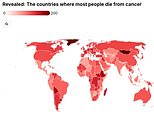
Cancer deaths worldwide are set to soar up to 75 per cent over the next two decades, leading experts have warned.
A rising and ageing population—combined with unhealthy lifestyles—are said to be fuelling the problem, researchers behind a damning new global report claim.
US scientists found that worldwide, the number of new cancer cases has more than doubled since 1990 to 18.5 million in 2023.
The number of cancer deaths, meanwhile, rose 74 per cent to 10.4 million.
But cases are predicted to soar even further to 30.5million by 2050—an increase of 61 per cent.
The annual global cancer death toll is forecast to rise almost 75 per cent to a staggering 18.6million.
Concerned scientists today urged governments to get a grip on the global cancer burden by tackling risk factors such as obesity and smoking.
They also urged policymakers to expand screening programmes that help catch cancer early, and boost survival odds.
Cancer Research UK’s chief executive, Michelle Mitchell, said: ‘The number of cancer cases and deaths are rising globally, and that trend is reflected here in the UK where there are nearly 1,100 new cases every day.
‘To save more lives from cancer, we need a greater international focus on prevention, including HPV vaccination and tobacco control.
‘Smoking remains the leading cause of cancer and death in the UK, which is why passing the Tobacco and Vapes Bill must be a top priority.
‘The UK Government’s upcoming National Cancer Plan for England is also a vital opportunity to provide the NHS with the funding, staff and resources needed to ensure cancer patients are diagnosed earlier and treated on time, no matter where they live.’
Dr Lisa Force, an assistant professor in health metric sciences at the University of Washington and study co-author, also said: ‘Despite the clear need for action, cancer control policies and implementation remain underprioritised in global health, and there is insufficient funding to address this challenge in many settings.’
‘Ensuring equitable cancer outcomes globally will require greater efforts to reduce disparities in health service delivery such as access to accurate and timely diagnosis, and quality treatment and supportive care.’
The study, published in the prestigious journal The Lancet, assessed cases and death rates for 47 types of cancer in 204 countries between 1990 and 2023.
After accounting for age which could skew the results, they found Lebanon saw the greatest increase in both cancer cases and deaths in the 33-year period, at 80 per cent.
Equatorial Guinea and Laos followed, logging cancer mortality rises of 72 and 55.8 per cent respectively.
By contrast, the United Arab Emirates saw the greatest decrease in cases, dropping 56 per cent.
Kazakhstan logged the greatest drop in deaths, falling 58.2 per cent.
The UK reported a 23.4 per cent fall in deaths, while the US and Australia recorded drops of 32.5 and 33.2 per cent respectively.
The researchers also found that breast cancer was the most diagnosed cancer worldwide in 2023, for both sexes combined.
Tracheal, bronchus, and lung cancer was the leading cause of cancer deaths.
However, the researchers also suggested that 42 per cent of cancer deaths globally were linked to lifestyle factors, including smoking, unhealthy diets, high blood sugar and exposure to toxins.
Tobacco use contributed to more than a fifth (21 per cent) of cancer deaths globally.
Among low-income countries, the leading risk factor was unsafe sex, accounting for 12.5 per cent of all cancer deaths.
More than 400,000 people in the UK—or 1,000 a day—are diagnosed with cancer each year, with prostate, breast, bowel and lung the most common types.
Cancer care effectively ground to a halt for some patients in 2020 when the pandemic first reached the UK’s shores, with appointments cancelled and diagnostic scans delayed because of the Government’s devotion to protecting the NHS.
Experts have estimated 40,000 cancers went undiagnosed during the first year of pandemic alone.
Now, however, NHS cancer services are still repeatedly failing to achieve their targets.
Figures released earlier this month showed NHS England met one of its three cancer diagnosis targets.
Of the 308,636 urgent cancer referrals made by GPs in July, 76.6 per cent were diagnosed or had the disease ruled out within 28 days. The target is 75 per cent.
But nationally, just 92.4 per cent of patients started treatment within 31 days of being booked in July, below the goal of 96 per cent.
And just 69.2 per cent of newly-diagnosed cancer patients referred for urgent treatment were seen within two months—below the 85 per cent target.
This article was originally published by a www.dailymail.co.uk . Read the Original article here. .

